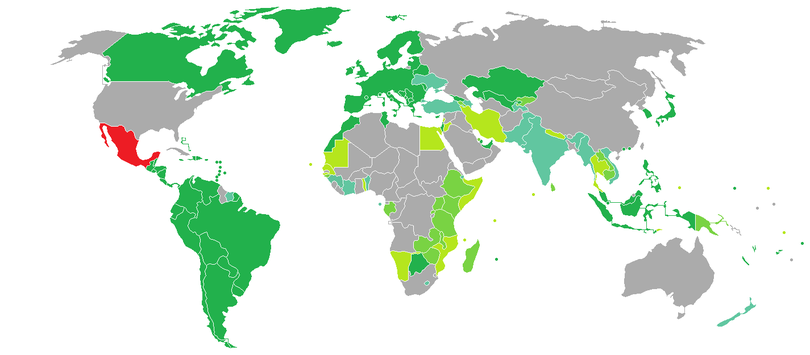Mexican nationality law
Nationality in Mexico is defined by multiple laws, including the 30th article of the Constitution of Mexico and other laws. The Constitution's 32nd article specifies the rights granted by Mexican legislation to Mexicans who also possess dual nationality. This article was written to establish the norms in this subject in order to avoid conflicts which may arise in the case of dual nationality. This law was last modified in 2005.
| Mexican Citizenship Act | |
|---|---|
 | |
| Congress of Mexico | |
Long title
| |
| Enacted by | Government of Mexico |
| Status: Current legislation | |
In general terms, Mexican nationality is based on both the principle of jus soli and the principle of jus sanguinis. The Mexican constitution also makes a distinction between nationals of Mexico and citizens of Mexico.
Acquisition of nationality
According to the 30th article of the Constitution of Mexico, there are two ways in which a person can acquire Mexican nationality: by birth or by naturalization.[1]
Nationality by birth
The Mexican Constitution states that Mexican nationals by birth are:[1]
- people born in Mexican territory regardless of parents' nationality or immigration status in Mexico
- people born abroad from a Mexican Citizen born in Mexico
- people born to an individual after that person has become a naturalized citizen of Mexico
- individuals born on Mexican merchant- or Navy ships or Mexican-registered aircraft, regardless of parents' nationality
- children born to Mexican Diplomats or Ministry of Foreign Affairs Personnel working overseas
Nationality by naturalization


Mexicans by naturalization are:[1]
- those who obtain from the Secretariat of Foreign Affairs a letter of naturalization and
- an individual married to a Mexican national residing in Mexico who fulfills the requirements set forth in the Mexican nationality law: to have lived with the spouse for two years immediately prior to the date of the application.
The Nationality Law establishes also that a foreigner that wishes to naturalize must do the following:[4]
- present the application to the Secretariat of Foreign Affairs;
- formulate the renunciation of the person's country of origin, and take the oath of sole nationality to Mexico. Once this has been given;
- prove knowledge of Spanish and Mexican history; integration to the national culture; and
- prove residence in Mexico for five years immediately prior to the submission of the application, or
- two years of residency if:
- a direct descendant of a Mexican by birth; or
- is the mother or father of a Mexican by birth; or
- is a national of a Latin American or Iberian country; or
- to the judgment of the Secretariat, she or he has performed or created outstanding works in a cultural, social, scientific, technical, artistic, sports or business area that benefit the nation, in which case, the foreigner is not required to have resided in the country for the number of years prescribed in the law; or
- one year of residency if adopted by a Mexican national, as well as all minors, who are second generation descendants or have been under tutelage of a Mexican national.
Possession of Mexican nationality
Mexican nationality entails several obligations set forth in the 31st article of the Constitution, namely:[5]
- to take their children or pupils to public or private schools to receive preschool, primary and secondary education; as well as military education as and if required by the law;
- to present themselves in the days and hours designated by the municipalities in which they reside to receive civic and military instruction;
- to enlist and serve in the National Guard to defend the independence, territory, honor, rights and interest of the nation;
- to contribute to the public expenditures through their taxes;
Documents that serve as proof of nationality are the following:[4]
- birth certificates;
- letter of naturalization;
- passports;
- national identity cards for minors (Cédula de identitad personal), and
- consular identity cards (Matricula consular) if they have a digital photograph, a magnetic band and a holographic identification.
Mexican citizenship
As in most other Central and South American countries, Mexican law differentiates between nationality and citizenship. Nationality is the attribute of the person in international law that describes their relationship to the State, whereas citizenship is given to those nationals (those who hold Mexican nationality) that have certain rights and responsibilities before the State. The 34th article of the Mexican constitution establishes that Mexican citizens are those Mexican [nationals] who are 18 years of age or older, and who have an "honest way of living". Mexican citizens have these rights:[6]
- vote in all elections;
- be elected in all elections
- gather or associate freely to participate in the political affairs of the nation;
- enlist in the Mexican Army or the Mexican National Guard to defend the Republic and its institutions, and
- exercise the right of petition.
Mexican law also distinguishes between naturalized citizens and natural-born citizens in many ways. Under the Mexican constitution, naturalized citizens are prohibited from serving in a wide array of positions, mostly governmental. Naturalized Mexicans cannot occupy any of following posts:
- The Mexican military during peacetime[7]
- Policeman[7]
- Captain, pilot, or crew member on any Mexican-flagged vessel or aircraft[7]
- President of Mexico[8]
- Member of the Congress of Mexico[9]
- Member of the Supreme Court of Mexico[10]
- Governor of a Mexican state[11]
- Mayor or member of the legislature of Mexico City[12]
Loss of nationality and loss of citizenship
The 37th article of the constitution establishes that Mexicans by birth (natural born Mexicans) can never be deprived of their nationality,[13] as defined in the Nationality law, in the acquisition of another nationality. However, naturalized Mexicans may lose their nationality by doing the following:[13]
- voluntarily acquiring another nationality, presenting themselves as foreigners or accepting nobility titles that imply a submission to a foreign state;
Even though Mexican nationals by birth can never involuntarily lose their nationality, Mexican citizenship, and thus its prerogatives, may be lost if a person does the following:[13]
- accepts nobility titles from foreign countries;
- serves in a foreign government without the authorization of the Congress of the Union;
- accepts or uses foreign distinctions, titles or functions, without the authorization of the Congress of the Union, with the exception of those that are literary, scientific or humanitarian in nature;
- helps a foreign citizen or government against Mexico in any diplomatic claim or before an International Tribunal.
Mexican nationals can give up their nationality for the purpose of acquiring another nationality.[14]
Multiple nationality
The Mexican nationality law acknowledges that a Mexican by birth may possess another nationality. If that is the case, however, such an individual must always enter and leave the country as a Mexican (by presenting a Mexican proof of citizenship). The law also established that regardless of possession of another nationality, an individual will always be considered a Mexican national and or cannot claim protection from a foreign country in certain cases:[4]
- participating in capital of an entity or a company if they are constituted according to the Mexican law; if
- giving credits to such entities; and if
- possessing property in Mexican territory.
All Mexican nationals by birth who possess another nationality cannot be elected for or work in public office only in those cases that the law clearly establishes that they must not acquire another nationality. If in such a case, she or he can request a Certificate of Nationality from the government, renouncing the other nationality.
Visa requirements

Visa requirements for Mexican citizens are administrative entry restrictions by the authorities of other states placed on citizens of Mexico. In 2018, Mexican citizens had visa-free or visa on arrival access to 158 countries and territories, ranking the Mexican passport 21st in terms of travel freedom according to the Henley visa restrictions index.[15]
References
- Artículo 30 Archived 2008-01-03 at the Wayback Machine de la Constitución Política de los Estados Unidos Mexicanos.
- Román, José Antonio (April 17, 2014). "México avanza con paso firme hacia un mejor porvenir, afirma Peña Nieto". La Jornada (in Spanish). Retrieved March 22, 2019.
- "El Presidente EPN recibe y da la bienvenida a los nuevos mexicanos". Mi Punto de Vista (in Spanish). April 17, 2014. Retrieved March 22, 2019.
- Ley de Nacionalidad. Secretaría de Relaciones Exteriores. Law as of 2005
- Artículo 31 Archived 2009-10-16 at the Wayback Machine de la Constitución Política de los Estados Unidos Mexicanos
- Artículo 34 Archived 2009-10-16 at the Wayback Machine de la Constitución Política de los Estados Unidos Mexicanos
- Artículo 32 Archived 2011-05-26 at the Wayback Machine de la Constitución Política de los Estados Unidos Mexicanos
- Artículo 82 Archived 2011-05-08 at the Wayback Machine de la Constitución Política de los Estados Unidos Mexicanos
- Artículo 55 Archived 2011-07-08 at the Wayback Machine de la Constitución Política de los Estados Unidos Mexicanos
- Artículo 95 Archived 2011-07-09 at the Wayback Machine de la Constitución Política de los Estados Unidos Mexicanos
- Artículo 117 Archived 2011-05-22 at the Wayback Machine de la Constitución Política de los Estados Unidos Mexicanos
- Artículo 122 Archived 2011-05-08 at the Wayback Machine de la Constitución Política de los Estados Unidos Mexicanos
- Artículo 37 Archived 2009-10-20 at the Wayback Machine de la Constitución Política de los Estados Unidos Mexicanos
- RENUNCIA DE LA NACIONALIDAD MEXICANA (POR NACIMIENTO Y POR NATURALIZACIÓN)
- "Global Ranking - Visa Restriction Index 2018" (PDF). Henley & Partners. Retrieved 29 December 2018.